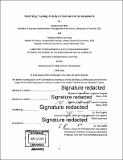Multi-stop trucking : a study on cost and carrier acceptance
Author(s)
Chen, Xiaojia (Xiaojia Amy); Tsai Yang, Shang Lin
DownloadFull printable version (12.95Mb)
Other Contributors
Massachusetts Institute of Technology. Engineering Systems Division.
Advisor
Chris Caplice.
Terms of use
Metadata
Show full item recordAbstract
Multi-stop truckload has been gaining importance in recent years as part of a shift away from Less-than-truckload freight. In our research, we sought to understand how the price and carrier behavior vary as the number of stops increases. Rational economic theory says that these shipments will be more expensive, and experience shows that in practice they also tend to get rejected more often. This thesis tested these two likely results together with other factors known for affecting price and rejection rates, such as lead time, clustering of the stops, etc. We used logistics regression to predict the acceptance ratio and ordinary least squares regression to model the price based on historical data. We found that there is an inherent cost associated with multi-stops, which depends on the number of stops and whether the stop is a pick or a drop. The proximity of these stops as well as the stop-off charge can also impact the price. Carrier acceptance and routing guide depth depends on the price structure and load characteristics. As the number of stops increases, it takes longer for a tender to be accepted and the shipment performance also deteriorates with an increased likelihood of late delivery especially if the initial pickup is late. Therefore, companies need to be aware of the hidden costs associated with multi-stop truckloads as they plan their transportation network.
Description
Thesis: M. Eng. in Logistics, Massachusetts Institute of Technology, Supply Chain Management Program, 2016. Cataloged from PDF version of thesis. Includes bibliographical references (pages 90-91).
Date issued
2016Department
Massachusetts Institute of Technology. Supply Chain Management ProgramPublisher
Massachusetts Institute of Technology
Keywords
Supply Chain Management Program., Engineering Systems Division.